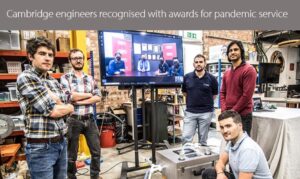CPL are delighted to be working alongside one of the two teams who have been recognised by the Royal Academy of Engineering for their work during the COVID-19 pandemic with the President’s Special Award for Pandemic Service. The engineers, from the Institute of Manufacturing and the Whittle Laboratory, are among the 19 winners announced today for exceptional engineering achievements in tackling COVID-19 in the UK. The awards have been made to teams, organisations, individuals, collaborations and projects across all technical specialities, disciplines and career stages within the UK engineering community who have contributed to addressing the challenges of the COVID-19 pandemic.
As part of the OVSI team, CPL are currently manufacturing parts for prototype testing and supporting ongoing design development.
Cambridge University Research News published this story today ….
 “Open Ventilator System Initiative
“Open Ventilator System Initiative
The team behind the Open Ventilator System Initiative was recognised for their development of a high-performance ventilator for manufacture in low and middle-income countries that became the first intensive care quality ventilator to be manufactured in Africa.
In March 2020, as Covid-19 infection rates were rising dramatically in Europe, the number of infections in many low- and medium-income countries remained low. However, it was predicted that towards the summer these rates would start to increase. This was especially worrying due to the low number of ventilators available in the developing world.
In response to these fears, a team at the University of Cambridge and a number of companies within the Cambridge cluster designed a high-performance intensive care ventilator for manufacture in low and middle-income countries. The aim was to develop a ventilator with a price point that was a factor of 10 lower than what was currently available, which could be manufactured from readily available components and which could be manufactured in-country. The result was the first clinical grade ventilator to be manufactured in Africa.
An engineering team led by Dr Tashiv Ramsander at Cambridge Aerothermal Ltd was quickly assembled at the Whittle Laboratory, and comprised people from several departments at the University of Cambridge and a range of local companies including Cambridge Aerothermal, Beko R&D, Cambridge Instrumentation and Interneuron.
Together, this multidisciplinary team was able to solve problems such as the design of a pressure relief valve, inspired by the mixing nozzles on the Rolls-Royce Trent 1000 aircraft engine. The design removed flow instabilities, resulting in a more stable operation than any commercially available valve.
The clinically driven design was developed with the help of two senior intensive care clinicians with experience of treating COVID-19. They argued that a design for developing countries needed to be more versatile than the UK government specification and the final design can operate in non-invasive, mandatory or patient-triggered ventilation modes.
For more than eight years the Whittle Laboratory has been developing a rapid technology development process for the aerospace and power generation sectors. During the pandemic this process was switched to develop a clinical grade ventilator within a week and allowing a rapid response to design changes driven by the pandemic, cost reduction and clinical demand.
The final Open Ventilator design can be manufactured mostly from standard parts, anywhere in the world that it is needed.
The reach and impact of COVID-19 in developing countries is not yet known, but this new design – the first intensive care quality ventilator to be manufactured in Africa – could prove to be a gamechanger when it comes to a host of conditions including pneumonia, as well as COVID-19. Childhood pneumonia killed 162,000 children in Nigeria alone in 2018.
There are very few ventilators in Africa, due to their high cost, inability to operate in harsh environments and a lack of local maintenance expertise. The team realised these problems could be solved by manufacturing the equipment in Africa. The Cambridge engineering team assembled a wider manufacturing team that includes Defy and Denel Land Systems in South Africa, Beko R&D and Prodrive in the UK and Arçelik in Turkey. This team delivered the first 20 preproduction ventilators in South Africa in June.
“The result is a design that will save countless lives in the developing world where ventilators are scarce and many that exist cannot achieve the quality of performance that the Open Ventilator offers,” said Professor Richard Prager, head of the Department of Engineering. “It is a scalable solution. The high-performance open-source design will enable companies across the world to make systems wherever they are needed, and at a price that is compatible with the local healthcare systems.”




